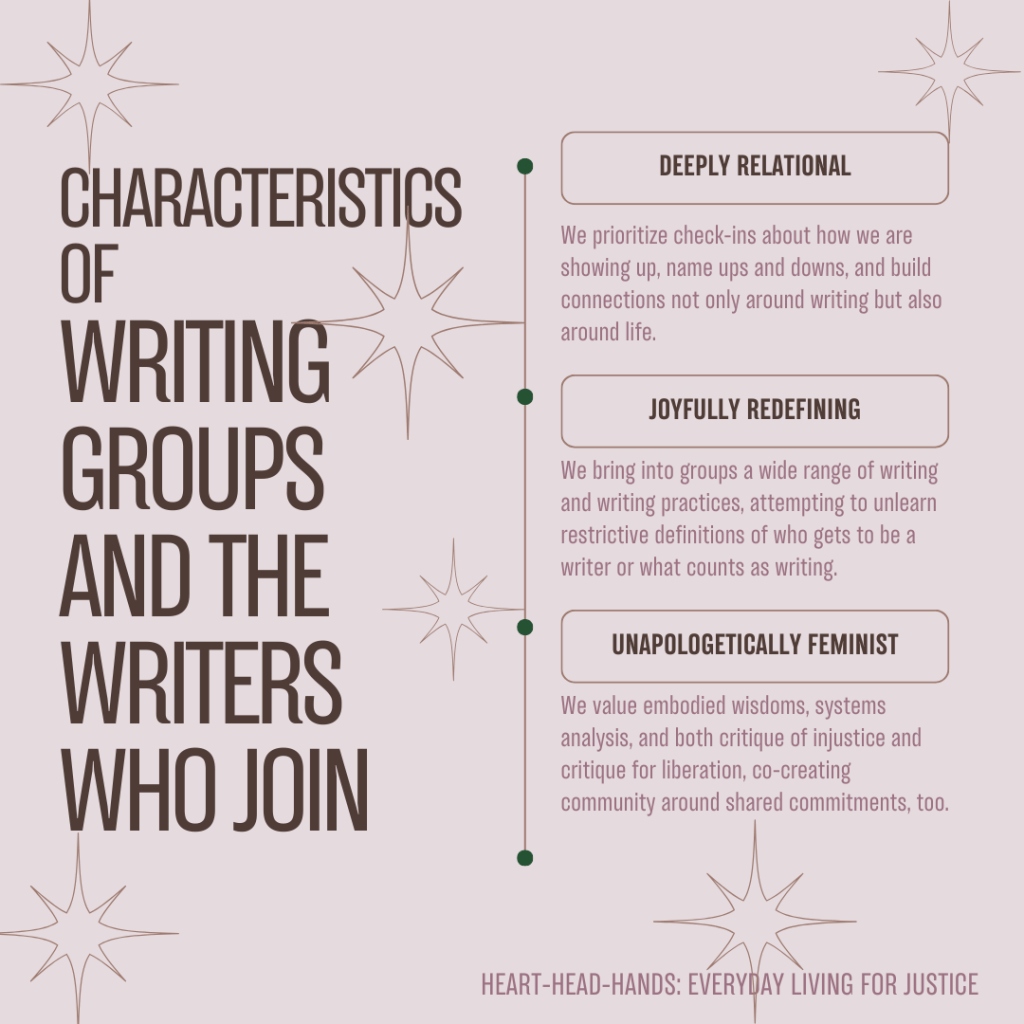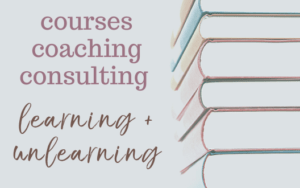You probably notice that when I talk about writing support and spaces — from coaching to writing groups to retreats and workshops — I don’t describe the work as “academic writing support” or name explicitly “academic writing.” This is despite the fact that many, MANY of the writers I work with and many of my closest people are doing academic projects, hold affiliations with academic institutions, and of course, are trained in academic ways. Me too!
Similarly, I am engaged in academic research (with a peer-reviewed article forthcoming). I earned tenure before leaving my faculty position. And I now do development editing and guide writers through grant and book proposals, dissertations and articles alike. I regularly read new academic texts, and I learn so much from academics in my life! In many ways I recognize (and surely many I don’t even notice), I am conditioned as an academic through-and-through.
So, why don’t I center “academic” in my work?
Of the many reasons, here are five:
- Because I really want academic pursuits, research writing, ongoing learning, and lifelong inquiry to be accessible and everyday parts of life. Anti-intellectualism runs rampant, and I really want us to break the “academic” and “nonacademic” dichotomy. This means both bringing what’s academic throughout all of life and also not attaching with the academic, especially as a means of division or elitism.
- Because I’ve found that the most flourishing writing communities are those in which we relate as writers, working across our particular projects and priorities, seeking clarity, and following creative callings. This means that we co-create a writing community around trying to show up for writing and ourselves as writers.
- Because I really want academics to be able to reclaim our full writing selves and know that the writing doesn’t have to be “academic.” We are writers, too, when journaling for ourselves, when creating grocery lists, when designing web pages, when telling stories, and when following inspiration. Our various kinds of writing are meaningful and deserve protected time and attention.
- Because I really want writers who don’t align or affiliate with “academic writing” to join the groups. Again, the most flourishing, fertile, flexible, fecund writing communities involve writers working across many sorts of writing, at many stages, with many commitments and dedications.
- Because I challenge all of us to reclaim and rename the writing we can dream into being, knowing that it can be public, familial, relational, personal, collective, committed, and so many other other qualities. Let’s not limit to “academic.”
Since I started this work in 2018, an industry has arisen of academic writing coaches, and I realize that I am both part of that and also resistive to it. In the same way that I defy business recommendations to narrow in (wanting instead to focus on the most expansive sense of everyday living for justice), I want to be reaching away from academic writing and toward public, committed, justice-oriented, meaningful writing.
It helps me to remember what I am for. It’s key to how I approach coaching and what I ask across conversations: What are you / I / we for?
So, with this clarity and with affirmations toward what’s possible in 2025, let me share three characteristics of the writing communities I attempt to co-create and of the writers who join:
- Deeply relational: We prioritize check-ins about how we are showing up, name ups and downs, and build connections not only around writing but also around life.
- Joyfully redefining: We bring into groups a wide range of writing and writing practices, attempting to unlearn restrictive definitions of who gets to be a writer or what counts as writing.
- Unapologetically feminist: We value embodied wisdoms, systems analysis, and both critique of injustice and critique for liberation, co-creating community around shared commitments, too.

If you see yourself in this description, maybe now is the time to connect around writing?
The new year brings many offerings: one-day online retreats (with dates January-March), a drop-in writing session (this Wednesday 1/8), weekly writing groups (Wednesdays and Fridays, starting later in January and re-opening for registration seasonally), and one-with-one coaching (reach out if you’d like to discuss options).
Truly, I’d love to connect in 2025.
This photo is from a recent writing retreat, as I was setting up for mid-day meditation. I hope you can feel the enthusiasm for this work, for being with and alongside others showing up for creative work that can shake things up.

Learn More about Writing Community
Finally, here are a few past blog posts about writing groups and retreats. May these give additional context and further invite you and the writers you love into community:
- “Writing Retreats Are for All Sorts of Writing”
- “Writing Support for the School Year (and Year-Round)”
- “Can Registration Be Relational? How I’m Longing for Sliding-Scale Registration to Work”
- “Reflective Poetry Prompts from Writing Retreats: A Contemplative Writing Practice”
- “Interrupting Writer’s Block: Writing (and Pausing) Through Resistance”
- “Caring for a Writer” from Candace Epps-Robertson, Ph.D.
—
This post is written by Beth Godbee, Ph.D. for Heart-Head-Hands: Everyday Living for Justice.
If you’d like to try a writing retreat, register here. There are typically five or six open dates at a time, and retreats are offered on different days to accommodate different schedules.
If you’d like to join the weekly writing group, register here. New groups open seasonally.
Registration is offered on a sliding-scale basis, reflecting commitments to accessibility and community care. If you need something not currently reflected through the registration page (e.g., a no-cost option or invoicing), reach out. We want to be sure that no one is priced out of participating.



Leave a Reply